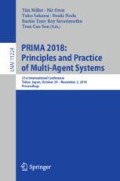Abstract
Deontic Defeasible Logic (DDL) is a simple and computationally efficient approach for the representation of normative reasoning. Traditionally defeasible logics are defined proof theoretically based on the proof conditions for the logic. In this paper we present an argumentation system that corresponds to a variant of DDL. The resulting machinery is able to grasp in a natural way intuitions behind deontic reasoning with conditional norms featuring obligations, prohibitions, and (strong or weak) permissions.
Access this chapter
Tax calculation will be finalised at checkout
Purchases are for personal use only
Notes
- 1.
As usual, the height of an argument is the number of edges on the longest path between the root and a leaf node.
- 2.
Arrows indicate the type of rule used.
References
Antoniou, G., Billington, D., Governatori, G., Maher, M.J.: Representation results for defeasible logic. ACM Trans. Comput. Logic 2, 255–287 (2001)
Atkinson, K., et al.: Towards artificial argumentation. AI Mag. 38(3), 25–36 (2017)
Beirlaen, M., Heyninck, J., Straßer, C.: Structured argumentation with prioritized conditional obligations and permissions. J. Log. Comput., exy005 (2018)
Beirlaen, M., Straßer, C.: A structured argumentation framework for detaching conditional obligations. CoRR abs/1606.00339 (2016)
Dung, P.M.: On the acceptability of arguments and its fundamental role in nonmonotonic reasoning, logic programming and n-person games. Artif. Intell. 77(2), 321–358 (1995)
Gabbay, D., Horty, J., Parent, X., van der Meyden, R., van der Torre, L. (eds.): Handbook of Deontic Logic and Normative Systems. College Publications, London (2013)
Governatori, G., Maher, M.J., Antoniou, G., Billington, D.: Argumentation semantics for defeasible logic. J. Log. Comput. 14(5), 675–702 (2004)
Governatori, G., Rotolo, A.: BIO logical agents: norms, beliefs, intentions in defeasible logic. Auton. Agents Multi-Agent Syst. 17(1), 36–69 (2008)
Governatori, G., Rotolo, A., Calardo, E.: Possible world semantics for defeasible deontic logic. In: Ågotnes, T., Broersen, J., Elgesem, D. (eds.) DEON 2012. LNCS (LNAI), vol. 7393, pp. 46–60. Springer, Heidelberg (2012). https://doi.org/10.1007/978-3-642-31570-1_4
Governatori, G., Rotolo, A., Sartor, G.: Temporalised normative positions in defeasible logic. In: Proceedings of the 10th International Conference on Artificial Intelligence and Law, pp. 25–34. ACM (2005)
Lam, H.-P., Governatori, G.: What are the necessity rules in defeasible reasoning? In: Delgrande, J.P., Faber, W. (eds.) LPNMR 2011. LNCS (LNAI), vol. 6645, pp. 187–192. Springer, Heidelberg (2011). https://doi.org/10.1007/978-3-642-20895-9_17
Lam, H.P., Governatori, G., Riveret, R.: On ASPIC\(^{+}\) and defeasible logic. In: Baroni, P. (ed.) Proceedings of 6th International Conference on Computational Models of Argument. IOS Press, Amsterdam (2016)
Prakken, H., Sartor, G.: Law and logic: a review from an argumentation perspective. Artif. Intell. 227, 214–245 (2015)
Prakken, H., Wyner, A.Z., Bench-Capon, T.J.M., Atkinson, K.: A formalization of argumentation schemes for legal case-based reasoning in ASPIC\(^+\). J. Log. Comput. 25(5), 1141–1166 (2015)
Riveret, R., Governatori, G., Rotolo, A.: Argumentation semantics for temporal defeasible logic. In: Proceedings of the 3rd Starting AI Researchers’ Symposium, pp. 267–268. IOS Press (2006)
Riveret, R., Prakken, H., Rotolo, A., Sartor, G.: Heuristics in argumentation: a game-theoretical investigation. In: Proceedings of the 2nd International Conference on Computational Models of Argument, pp. 324–335. IOS Press (2008)
Sartor, G., Rudnianski, M., Rotolo, A., Riveret, R., Mayor, E.: Why lawyers are nice (or nasty): a game-theoretical argumentation exercise. In: Proceedings of the 12th International Conference on Artificial Intelligence and Law, pp. 108–117. ACM (2009)
Author information
Authors and Affiliations
Corresponding authors
Editor information
Editors and Affiliations
Rights and permissions
Copyright information
© 2018 Springer Nature Switzerland AG
About this paper
Cite this paper
Governatori, G., Rotolo, A., Riveret, R. (2018). A Deontic Argumentation Framework Based on Deontic Defeasible Logic. In: Miller, T., Oren, N., Sakurai, Y., Noda, I., Savarimuthu, B.T.R., Cao Son, T. (eds) PRIMA 2018: Principles and Practice of Multi-Agent Systems. PRIMA 2018. Lecture Notes in Computer Science(), vol 11224. Springer, Cham. https://doi.org/10.1007/978-3-030-03098-8_33
Download citation
DOI: https://doi.org/10.1007/978-3-030-03098-8_33
Published:
Publisher Name: Springer, Cham
Print ISBN: 978-3-030-03097-1
Online ISBN: 978-3-030-03098-8
eBook Packages: Computer ScienceComputer Science (R0)

